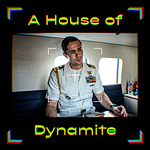Otto Preminger’s Exodus isn’t just a sweeping Hollywood epic but a foundational text of the postwar Zionist imagination. Van and Lyle are joined by journalist David Meir Grossman to dissect the 1960 film and its enduring legacy. Together, they parse the film’s aesthetics and ideology, its thinly veiled apologetics for settler colonialism, and its staging of Jewish suffering as license for state power.
From the very first scene, where a tour guide on Cyprus rattles off its many conquerors with oblivious irony, the film makes clear that it sees empire not as problem but backdrop. The British are cast as bureaucratic brutes, the Arabs as angry fanatics, and the Jews as righteous protagonists caught between. But this story collapses under its own contradictions: The hunger strike led by Jewish detainees mirrors tactics long used by Palestinians; mothers proclaim they would rather die with their children than be deported, a form of resistance the film treats with reverence. Yet when Palestinians make similar claims decades later, they are cast as monstrous, even suicidal.
The conversation also revisits the film’s iconic characters. Paul Newman’s Ari Ben-Canaan embodies the Zionist hero as charismatic, haunted, and certain that Jewish liberation can be achieved without reckoning with anyone else’s. Then there’s Kitty Fremont, the well-meaning American nurse whose imperious naïveté mirrors the U.S.’s own posture toward the region.
David, Van, and Lyle trace how Exodus anticipates not only the mythologies of the Israeli state but also the moral blind spots of its liberal defenders. They explore the film’s revealing attempts at nuance—such as the friendship between Ari and the Palestinian character Taha (played by the white American heartthrob John Derek)—and why those gestures fall flat in the face of the larger narrative. If Exodus helped consecrate Israel’s founding story for American audiences, this episode tries to read between its frames.
Further Reading
The Question of Zion (2005), by Jacqueline Rose
“Zionism from the Standpoint of Its Victims” (1979), by Edward Said
Diaspora Boy: Comics on Crisis in America and Israel (2017), by Eli Valley
On the Arab-Jew, Palestine, and Other Displacements (2017), by Ella Shohat
Justice for Some: Law and the Question of Palestine (2019), by Noura Erakat
Teaser from the Episode
Exodus Trailer
The full video episode for our coverage of Exodus is available as an unlisted link on YouTube, just for paid subscribers, below:














